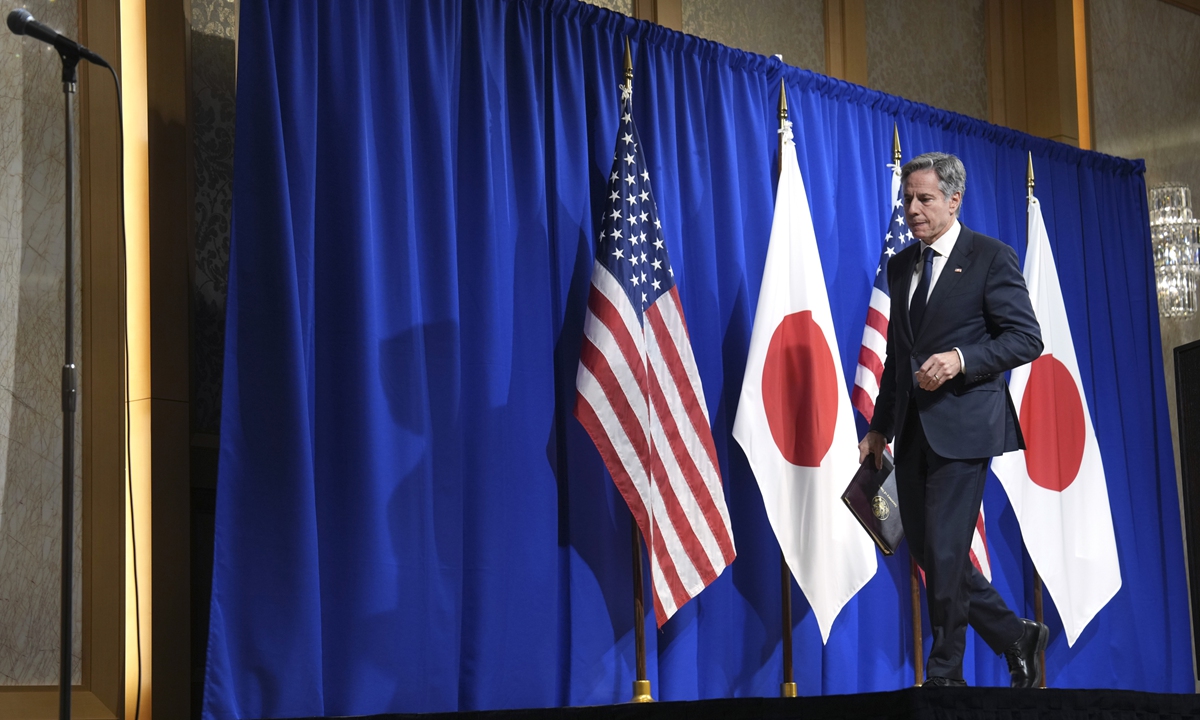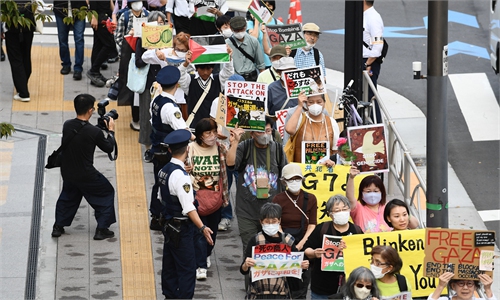US in awkward position as divisions grow with Israel and allies
Insubstantial G7 statement reflects failure to bridge gap, 'not helpful' in solving the crisis

US Secretary of State Antony Blinken walks away after his news conference after the Group of 7 Foreign Ministers meetings Wednesday, Nov. 8, 2023, in Tokyo. Photo: VCG
With cracks widening in recent days after the White House failed to persuade Israel over a range of issues in Gaza, Washington, unable to bridge the gaps among its closest allies, finds itself in an increasingly awkward position. An insubstantial joint statement was released at the last minute after a meeting of the G7 foreign ministers on Wednesday, which experts said will be of little actual help to solve the crisis but reflects allies' growing distrust in Washington.
Winding up a two-day meeting in Tokyo, the G7 foreign ministers issued a "unified message" on the Israel-Palestine conflict late on Wednesday evening, including a call for a humanitarian pause in the fighting and a "peace process," Reuters reported, citing Japanese Foreign Minister Yoko Kamikawa.
Analysts considered the statement highlights the difficulties of reaching a consensus, and it has little substantial content that would actually help the humanitarian disaster or deescalate the tension, but is only a reiteration of previous appeals. While Blinken has called on G7 members to "come together in the face of this crisis and to speak, as we do, with one clear voice," the group of rich nations is becoming the latest US-led clique to find itself divided by the war, analysts said.
The White House suggested on Tuesday that Israeli forces should not reoccupy Gaza, soon after Israeli Prime Minister Benjamin Netanyahu commented that the country will have the "overall security responsibility" in Gaza for an "indefinite period" after the war ends, CNN reported.
It is also the latest of a series of views Netanyahu has voiced that diverge from the White House, following Israel's blunt rejection of US Secretary of State Antony Blinken's calls for a "humanitarian pause" to allow hostages and civilians to leave Gaza and for aid for Palestinians to enter.
"There is nothing much it [the White House] can do to stop the pace of Israel," Tian Wenlin, a research fellow at the China Institutes of Contemporary International Relations, told the Global Times on Wednesday, adding that the powerful influence of the Jewish lobby.
Tian noted that the widening gap between the US and Israel is a result of their different goals and demands. While Israel aims to deter the Palestinians and seek retaliation, the US seeks to de-escalate the conflict as soon as possible, so that its other agendas will not be affected.
Zhu Yongbiao, director of the Center for Afghanistan Studies at Lanzhou University, believe that the "stern" warnings of the White House appear more like an act of "double dealing," aimed at absolving itself of responsibility amid outbursts of fury domestically and internationally, as well as a deepening rift with allies.
"The US' double standards and excessive bias toward Israel are leading to a collapse of its credibility and trust among allies. For the US alliance system, the Ukraine crisis is a test of Washington's strengths, while the Palestinian crisis is a test of conscience. And out of their conscience, its allies are distancing themselves from the US, albeit they still have to align verbally with it," Lü Xiang, a research fellow at the Chinese Academy of Social Sciences told the Global Times on Wednesday.
The main disagreements lie in how much pressure to put on Israel to make the "humanitarian pause" happen, and the implementation of the two-state solution - a proposal that the great majority of countries support, observers said.
At last month's UN General Assembly, France was the only G7 country to support a resolution calling for an "immediate and sustained" break in the war and condemning "all acts of violence aimed at Palestinian and Israeli civilians." Canada, Germany, Italy, Japan and the UK abstained while the US voted against, according to media reports.
The primary cause of this division is the more-than-obvious double standards the US has displayed on its so-called value-based diplomacy, as seen in the sharp contrast in its attitude toward Ukraine and Palestine, experts said.

